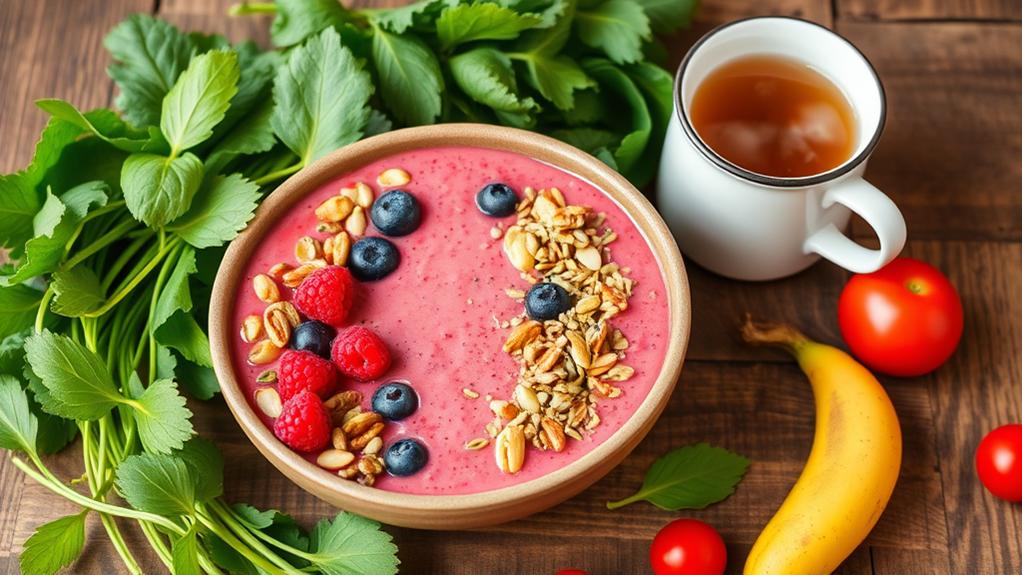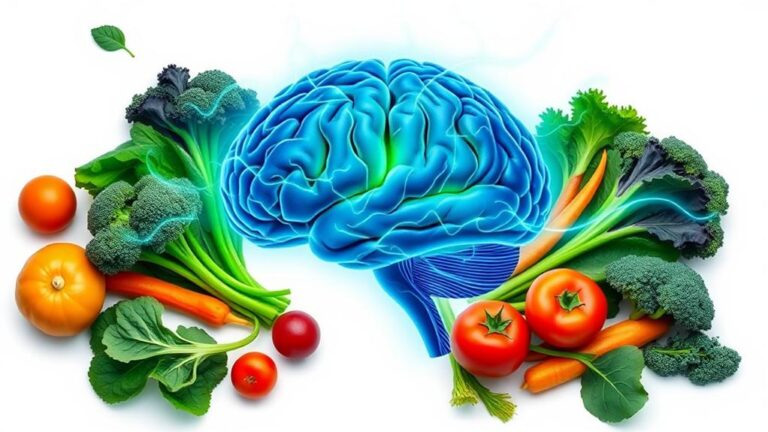Imagine you've just cut down on carbs, but instead of feeling energetic, you're dragging through your day like a sloth. This scenario isn't uncommon, but it doesn't have to be your reality. By adjusting your approach and incorporating specific strategies, you can enhance your energy levels during this shift. From prioritizing protein to monitoring your hydration, there are practical steps you can take to feel revitalized. Curious about how to make these adjustments seamlessly?
Understand Carb Reduction Basics
Understanding carb reduction basics is vital for anyone looking to improve their health and energy levels. When you reduce your carbohydrate intake, you're likely to experience various benefits, including stabilized blood sugar levels and decreased hunger.
Start by identifying high-carb foods in your diet, like bread, pasta, and sugary snacks. You don't have to eliminate them entirely, but cutting back can appreciably impact how you feel. For those following a ketogenic approach, limiting carbs to 20-50 grams per day can help induce ketosis, a state where your body burns fat for fuel.
Focus on incorporating more whole foods, like vegetables, lean meats, and healthy fats. These foods not only provide essential nutrients but also help keep you satisfied without the energy crashes associated with high-carb meals.
It's essential to listen to your body and notice how it responds to different carbohydrate levels. Some people thrive on lower carbs, while others may need a moderate approach.
Don't forget to stay hydrated. Drinking enough water can help curb cravings and maintain your energy throughout the day.
As you adjust your diet, keep track of how your energy levels change. This awareness will empower you to make informed decisions about your carb intake, guiding you toward a healthier lifestyle that supports your energy needs.
Prioritize Protein Intake
Protein plays an essential role in your diet, especially when reducing carbs. It helps maintain muscle mass, supports recovery, and keeps you feeling full longer. When you cut back on carbohydrates, your body needs a steady supply of protein to function effectively and prevent muscle breakdown. This is particularly important when following a keto diet, which typically limits carbohydrate intake to 20-50 grams daily.
Aim to include a variety of protein sources in your meals. Lean meats, poultry, fish, eggs, dairy, legumes, and plant-based proteins are excellent choices. These foods not only provide the necessary amino acids but also help stabilize your blood sugar levels, minimizing energy crashes.
Don't forget about portion sizes; make sure you're consuming enough protein to meet your body's needs. A good guideline is to aim for about 20-30 grams of protein per meal. This amount can help you feel energized throughout the day and support your weight loss or maintenance goals.
Additionally, consider spreading your protein intake across meals and snacks instead of loading it all into one sitting. This approach can enhance satiety and maintain energy levels.
Incorporate Healthy Fats
Alongside prioritizing protein, incorporating healthy fats into your diet can greatly enhance your energy levels during carb reduction.
Healthy fats provide a concentrated source of energy and support your body's ability to burn fat for fuel. The keto diet emphasizes high fat intake, typically 70-80% of daily calories, to promote ketosis and maintain energy levels.
Here are four excellent sources of healthy fats you should consider adding to your meals:
- Avocados: Rich in monounsaturated fats, avocados not only provide energy but also help keep you feeling full longer.
- Nuts and Seeds: Almonds, walnuts, chia seeds, and flaxseeds are packed with healthy fats, protein, and fiber, making them perfect for snacks or toppings.
- Olive Oil: Use extra virgin olive oil in your dressings or for cooking. It's a great source of antioxidants and healthy fats.
- Fatty Fish: Salmon, mackerel, and sardines are high in omega-3 fatty acids, which are crucial for brain function and can reduce inflammation.
Stay Hydrated
Staying hydrated is essential when you're reducing carbs, as it helps maintain your energy levels and supports overall health. When you cut back on carbohydrates, your body may shed water weight, leading to dehydration if you're not careful. Drinking enough water can help you feel more energized and focused throughout the day.
Aim to drink at least eight 8-ounce glasses of water daily, but adjust this based on your activity level and individual needs. If you're exercising or spending time in hot weather, increase your intake to replenish lost fluids. Carry a reusable water bottle with you to make it easier to stay on track.
You can also incorporate hydrating foods into your diet, like cucumbers, lettuce, and watermelon. These not only provide hydration but also add valuable nutrients. Herbal teas and infused waters can be great alternatives if you're looking for a flavor boost.
Listen to your body; if you feel thirsty, don't wait—drink up! Staying hydrated not only supports your energy levels but also helps with digestion and keeps your skin looking healthy.
Monitor Electrolyte Levels
As you focus on reducing carbs and increasing hydration, don't overlook the importance of monitoring your electrolyte levels. When you cut back on carbs, your body may excrete more water and electrolytes, leading to imbalances that can drain your energy.
Keeping an eye on these essential minerals can help maintain your liveliness.
Here are four key electrolytes to monitor:
- Sodium: This helps regulate fluid balance and nerve function. Low levels can cause fatigue and headaches.
- Potassium: Critical for muscle contractions and heart health, inadequate potassium can lead to weakness and cramps.
- Magnesium: This mineral plays a role in energy production and muscle relaxation. Low magnesium can result in fatigue and irritability.
- Calcium: Fundamental for bone health and muscle function, low calcium levels can lead to muscle cramps and overall weakness.
To maintain balanced electrolyte levels, consider incorporating foods rich in these minerals or using electrolyte supplements.
Staying aware of your intake not only boosts your energy but also supports your overall well-being during your carb reduction journey.
Choose Low Glycemic Foods
When you're reducing carbs, choosing low glycemic foods can make a significant difference in your energy levels and overall health. Low glycemic foods are digested slowly, leading to a gradual release of glucose into your bloodstream. This helps you maintain stable energy levels throughout the day, avoiding the spikes and crashes associated with high glycemic foods.
Incorporate foods like leafy greens, berries, nuts, and whole grains into your meals. These options not only provide essential nutrients but also keep your blood sugar levels steady.
Avoid processed snacks and sugary treats, as they can lead to quick energy spikes followed by crashes that leave you feeling tired and sluggish.
It's also helpful to pair low glycemic foods with healthy fats and proteins. This combination can further enhance satiety and energy stability. Instead of reaching for that donut, opt for a handful of almonds or a piece of fruit.
Over time, you'll notice an improvement in your overall energy levels and mood. By consciously choosing low glycemic foods, you're setting yourself up for success on your journey toward enhanced energy while reducing carbs.
Plan Balanced Meals
Planning balanced meals is essential for maintaining energy levels while reducing carbs. By focusing on a variety of nutrients, you can keep your body fueled and satisfied.
Here's how to create balanced meals that support your energy needs:
- Include Protein: Aim for lean sources like chicken, fish, beans, or tofu. Protein helps repair tissues and keeps you full longer.
- Add Healthy Fats: Incorporate avocados, nuts, or olive oil. Healthy fats provide sustained energy and support brain function.
- Choose Non-Starchy Vegetables: Fill your plate with a variety of colorful veggies like spinach, broccoli, and bell peppers. They're low in carbs and rich in vitamins.
- Mind Your Portions: Be mindful of serving sizes, especially with higher-calorie foods. Balancing portions helps avoid energy crashes.
Schedule Regular Exercise
Regular exercise is essential for boosting energy levels, especially when reducing carbs. When you engage in physical activity, your body releases endorphins, which can elevate your mood and increase your overall liveliness.
Aim to incorporate a mix of cardiovascular, strength, and flexibility exercises into your routine. This combination not only enhances endurance but also helps maintain muscle mass, which is critical when cutting down on carbohydrates.
Try to schedule your workouts at times that suit your lifestyle. Whether it's a morning jog, a lunchtime yoga session, or an evening gym visit, consistency is key. You don't need to spend hours at the gym; even short bursts of activity can make a significant difference.
Aim for at least 150 minutes of moderate aerobic exercise each week, along with two days of strength training.
Listen to your body and adjust the intensity based on how you feel. If you're feeling drained, consider lighter activities like walking or stretching.
Get Adequate Sleep
Sleep is a crucial element in maintaining your energy levels, especially during a carb reduction journey. When you cut down on carbs, your body adjusts, and you might feel more fatigued.
Prioritizing sleep can help combat this fatigue and keep your energy up. Here are four tips to guarantee you're getting the rest you need:
- Establish a Sleep Schedule: Go to bed and wake up at the same time every day. Consistency helps regulate your body's internal clock.
- Create a Relaxing Bedtime Routine: Engage in calming activities before bed, like reading or meditating. This signals your body that it's time to wind down.
- Limit Screen Time: Reduce exposure to screens at least an hour before bed. The blue light emitted can interfere with your ability to fall asleep.
- Optimize Your Sleep Environment: Keep your bedroom cool, dark, and quiet. Consider using blackout curtains or white noise machines to enhance your sleep quality.
Listen to Your Body
When starting on a carb reduction journey, it's vital to listen to your body's signals. Your body is constantly communicating with you, and tuning in can greatly enhance your energy levels. Pay attention to how you feel after meals—are you energized, or do you feel sluggish? If you're often tired, it might indicate that your body needs more healthy fats or proteins.
Also, be mindful of hunger cues. If you're genuinely hungry, don't ignore it; instead, opt for nutrient-dense snacks like nuts or avocados. On the flip side, if you're feeling full but still reach for food out of habit, consider whether a change in routine might help.
Hydration is another key factor. If you're feeling fatigued, it could simply be a sign that you need more water. Keeping a water bottle handy can encourage you to drink more throughout the day.
Lastly, don't hesitate to adjust your carb intake based on how your body responds. Every individual is different, so what works for someone else mightn't work for you. Trust your instincts, and make adjustments that support your energy and well-being.
Conclusion
By embracing these tips, you'll transform your carb reduction journey into a vibrant path filled with energy and liveliness. Picture yourself waking up refreshed, fueled by lean proteins and healthy fats, while your body dances through workouts with ease. As you listen to your body and nourish it wisely, you'll discover a newfound zest for life. So gear up and take charge—your enhanced energy awaits just around the corner!



